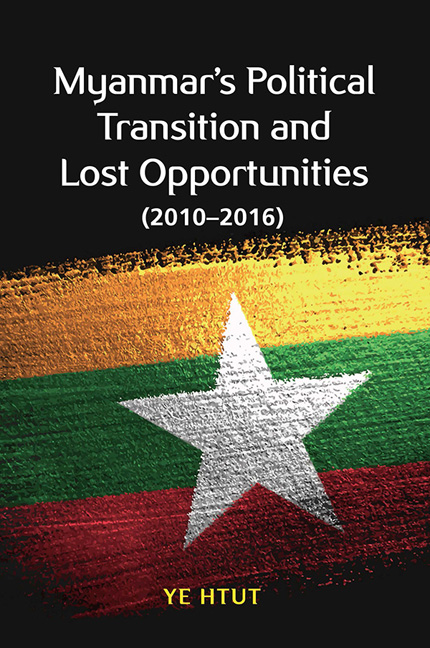Book contents
- Frontmatter
- Contents
- Foreword
- Acknowledgements
- Introduction: Myanmar's Political Reforms
- 1 The National Convention
- 2 The Constitution
- 3 The Union Solidarity and Development Party
- 4 Myanmar Spring and Aung San Suu Kyi
- 5 The Union Government
- 6 The Government and the Parliament
- 7 Shwe Mann's Checkmates
- 8 Turning Points
- 9 Media Reform
- Epilogue
- Appendix A President Thein Sein's Inaugural Address
- Appendix B President Thein Sein's First Address to the Cabinet
- List of Interviewees
- Index
- About the Author
- Plate section
Introduction: Myanmar's Political Reforms
Published online by Cambridge University Press: 25 January 2020
- Frontmatter
- Contents
- Foreword
- Acknowledgements
- Introduction: Myanmar's Political Reforms
- 1 The National Convention
- 2 The Constitution
- 3 The Union Solidarity and Development Party
- 4 Myanmar Spring and Aung San Suu Kyi
- 5 The Union Government
- 6 The Government and the Parliament
- 7 Shwe Mann's Checkmates
- 8 Turning Points
- 9 Media Reform
- Epilogue
- Appendix A President Thein Sein's Inaugural Address
- Appendix B President Thein Sein's First Address to the Cabinet
- List of Interviewees
- Index
- About the Author
- Plate section
Summary
The “Myanmar Spring” or Myanmar's road to democracy commenced on 30 March 2011. That morning, newly elected President Thein Sein delivered his inaugural address to the Pyidaungsu Hluttaw (Union assembly). This was the first speech of the first competitively elected head of state by the parliament and, indirectly, the citizens of Myanmar since the 1962 military coup.
Although it was broadcast live, except for a few scholars and journalists, the majority of the people of Myanmar as well as the international community gave very little attention to the speech. As the ruling party, the Union Solidarity and Development Party (USDP), was backed by the military, and the elected president was a former general and the prime minister of the previous military government, they saw the new government as a quasi-military regime—the same old wine in a new bottle.
Myanmar had held a general election on 7 November 2010 under a new constitution. The constitution had been formally adopted following a referendum in 2008. The previous military government stated that this election was the starting point for a democratization process, but given the contentious nature of the election process, the international community rejected the election result. For example, the International Crisis Group took the following view of the elections and the subsequent government under President Thein Sein:
[the] Union Solidarity and Development Party (USDP) won a landslide victory leaving the military elite still in control. Together with the quarter of legislative seats reserved for soldiers, this means there will be little political space for opposition members in parliament. The new government that has been formed, and which will assume power in the coming weeks, also reflects the continued dominance of the old order with the president and one of the two vice presidents drawn from its ranks and a number of cabinet ministers recycled.
The United States government, the leading power critical of the military government, stated that the elections “were neither free nor fair and failed to meet any internationally accepted standards” and that “Myanmar missed an opportunity to begin genuine transition toward democratic governance and national reconciliation.”
- Type
- Chapter
- Information
- Publisher: ISEAS–Yusof Ishak InstitutePrint publication year: 2019



